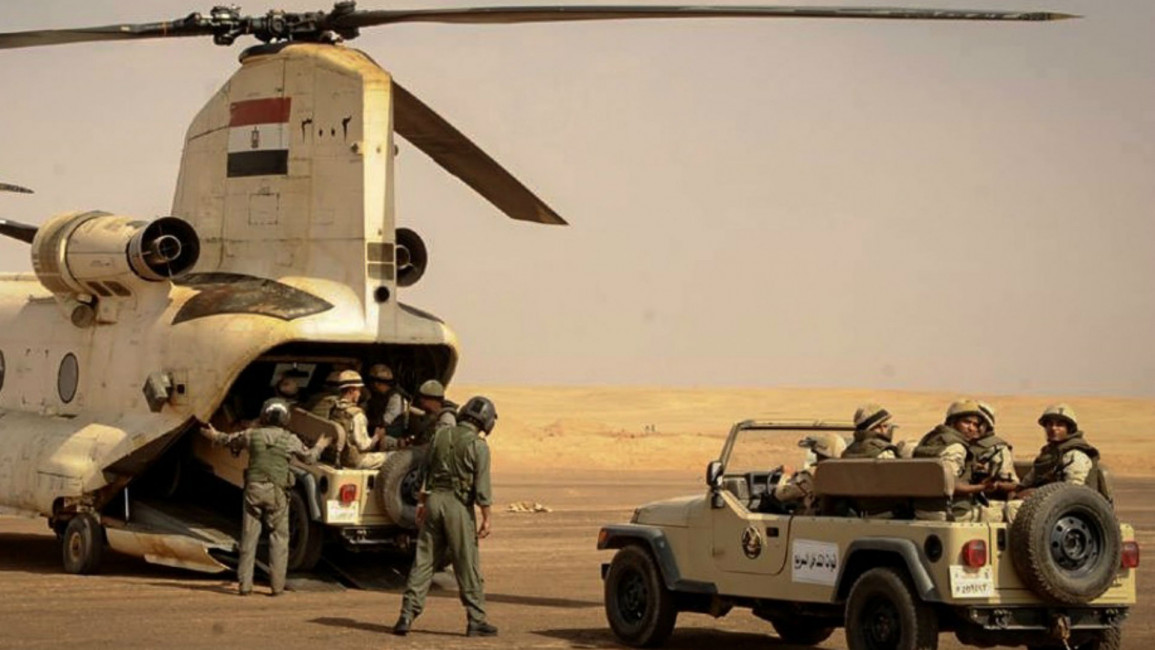
US peacekeeping Sinai force trapped in diplomatic limbo
Not far from the Egyptian Islamic State group's base lies the little-known US military outfit - Task Force Sinai.
Judging from the name one might expect the troops to be part of an elite counter-terrorism unit, set-up specifically to tackle groups such as IS in the troubled peninsula.
While the 700 soldiers in the force are tasked with keeping the peace, it is probably not one you would expect.
"They are based in al-Gorah and al-Arish and their purpose is part of the Camp David agreement," said Sam Charles Hamad, a writer on Middle East affairs. "And no, the Egyptian regime and Israel don't want them to leave."
The Camp David Accord was agreed between Egypt and Israel in 1978, and the peace between the two countries has remained strong ever since.
Relations between Israel and Egypt are probably at their closest yet under the anti-Islamist President Abdel Fattah al-Sisi who has given himself a self-imposed mandate to tackle unruly anti-regime tribal groups in the Sinai.
Some poverty-stricken Sinai residents are believed to have worked with smuggling groups in Hamas-run Gaza, while other groups have blown up gas pipelines. The army has clamped down hard on all outside its control.
Since then, chaos and anarchy has ensued in large parts of the Sinai, which for decades has been neglected by central government. The province has been crippled by unemployment and poverty with little scope of the future getting better for residents.
"The grievance began many years ago due to the Egyptian government ignoring the Sinai. The Bedouins in the area began to revolt after the coup and IS - or more accurately Ansar Beit al-Maqdis, which had been affiliated to al-Qaeda - exploited it and essentially took over," according to Hamad.
Hamad said that the Egyptian military's brutal counter-insurgency campaign - which included scorched earth tactics - essentially pushed some tribes into the hands of the IS-linked militants.
 |
Its peacekeeping role has no practical purpose other than fulfilling the terms of Camp David. - Sam Charles Hamad |
 |
IS' Wiliyat Sinai is little more than a couple of small stretches of land in the peninsula, but they lie not far from the US troops base.
A roadside bomb in September injured four US servicemen and two other international peacekeepers sparking fears of mission creep.
Now, Washington is considering withdrawing some troops from this expensive, needless and increasingly precarious military presence in the Sinai and using drones for "peacekeeping" duties.
"Its peacekeeping role has no practical purpose other than fulfilling the terms of Camp David," said Hamad. "Israel and Egypt get along swimmingly so nobody has any real idea why they are there."
Mathew Leatherman writing for Defense One said that many military planners also appear puzzled about the troops role in the Sinai after four decades of peace between Israel and Egypt.
"Some Army bureaucrats at Fort Bragg's 1st Theater Sustainment Command are tired of footing the combat pay premium that comes along with this inertia, so they've recommended cutting it. Implicitly, that's an acknowledgement that we have completed the mission of building peace between Israel and Egypt," he wrote in February.
Meanwhile, defence staff are also concerned that US forces in the Sinai could be targeted - or dragged into a war with - IS militants.
Bizarrely, the force is led by the US National Guard, and they might attempt to oppose the withdrawal plans to prove they have a purpose other than a reserve role.
But with chaos remaining in the Sinai, Americans don't want to see dead US "peacekeepers" returning, particularly after four decades of quiet between Egypt and Israel and the fulfillment of their role in the Sinai.




